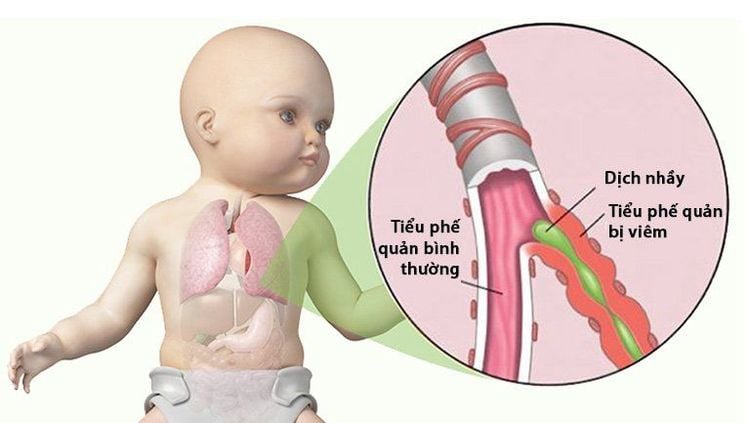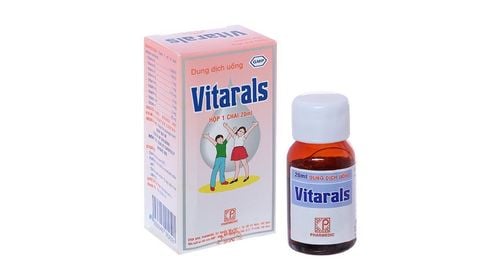This is an automatically translated article.
Seasonal weather is a favorable factor for pathogenic microorganisms to develop, attacking infants and young children who do not have strong resistance. A lower respiratory tract infection that is common in children and can progress to severe pneumonia is bronchiolitis. In the video below, Doctor Nguyen Thai Ngoc Chau, Pediatrician, Vinmec Phu Quoc General Hospital will share the culprits causing bronchiolitis in children, for effective prevention.Video content is professionally consulted by Doctor Nguyen Thai Ngoc Chau, Doctor of Pediatrics, Vinmec Phu Quoc International General Hospital
1. Children at risk of bronchiolitis
Bronchiolitis is inflammation of the small bronchi or small airways, close to the alveoli where the body's gas exchange is. The disease is common in children under 24 months of age. 80% in children 2-6 months old. There are many causes of the disease, the most common being viruses, including: RSV virus, Adenovirus, Influenza virus, Coronavirus, and less commonly Mycoplasma pneumoniaPeople at very high risk of RSV infection such as:
Premature babies months at high risk of apnea Children under 3 months of age Children with chronic lung disease or congenital heart disease Children with comorbid infections: otitis media, lung superinfections Children with immunocompromised children Children with disorders neuromuscular system such as difficulty swallowing or increased mucus secretion Children exposed to tobacco smoke The disease is spread by direct contact with people in the family or in daycare, illness through respiratory secretions when coughing, sneezes, or indirectly through the hands of caregivers, healthcare workers, or children's toys.

2. RSV virus and its effects on children's health
RSV virus after invading and multiplying in the upper respiratory tract, the virus arrives fixed and continues to grow on bronchiole epithelial cells causing:Respiratory epithelial necrosis Destruction of villi Cells Edema submucosa Cell debris and fibrin (non-burin) fibers form plugs that block the bronchial lumen, creating alveolar gas retention, causing wheezing and shortness of breath when the child exhales. If the bronchial lumen is completely blocked, it will cause atelectasis. During the first few days of RSV infection, children have mild symptoms such as fever, cough, and runny nose. Then gradually increased. Parents need to take the child to the hospital as soon as the following signs appear:
Wheezing or heavy breathing The child becomes sad, less active than usual The child coughs with sputum continuously The child stops breathing The child refuses to breathe. breast-feeding or bottle-feeding Signs of dehydration such as crying without tears, little or no urine in diapers for 12 hours, cold, dry skin. Statistics in the United States, every year, 1 to 2 out of 100 children under 6 months of age need to be hospitalized because of RSV infection, need oxygen intervention, intubation, or ventilator support for children. Most cases of RSV infection improve with supportive care, children reduce wheezing after 3-4 days, completely recover from 1-2 weeks.
However, the child can have complications:
Acute respiratory failure usually occurs 24 - 48 hours after admission, if not treated promptly, can lead to death. Microbial superinfection often makes treatment difficult and prolonged Dehydration if the child is not provided with enough water and fluids The child is malnourished due to insufficient food intake Wheezing lasting up to a few days months make the baby oxygen dependent, which can lead to pulmonary dysplasia. In the hospital, to diagnose RSV virus, children are examined clinically, including listening to the lungs, asking parents about the child's medical history and progress. A number of tests may be ordered, including:
Chest X-ray to evaluate lung damage Blood gases: necessary in severe cases to evaluate gas exchange, oxygen supply. Complete blood cell analysis Ion(i) blood smear Test sputum, nasal secretions to look for RSV virus or other causes of illness. Treatment of children with bronchiolitis includes improving the symptoms of the disease and limiting the severe impact on the child's respiratory system. Mild cases can be treated at primary health care or can be cared for at home as follows:
Clean nasal mucus with physiological saline drops to help clear the child's airways Ensure adequate room Humidifier (a humidifier can be used) to make breathing easier. Give your child water to drink divided into several times a day to ensure adequate hydration. Feed the baby normally. For infants, increase the frequency of breastfeeding. Use fever-reducing medicine when the child has a fever, such as acetaminophen (a Fibromyalgia) Closely monitor the progress of the disease Re-examine after 2 days or re-examine as soon as one of the serious signs such as: stop feeding, fever high, irregular breathing, cyanosis. Severe cases requiring hospitalization, treatment include:
Respiratory support: Breathing humidified oxygen through the cannula, NCPAP breathing - breathing continuous positive pressure through the nose, or mechanical ventilation Bronchodilators Respiratory physiotherapy Antibiotics for bacterial superinfection Provide adequate water and nutrition by nasogastric or intravenous feeding Use the antiviral drug Ribavirin to prevent synthesis viral proteins. The pediatric department at Vinmec International General Hospital is the address for receiving and examining diseases that infants and young children are susceptible to: viral fever, bacterial fever, otitis media, pneumonia in children ,....With modern equipment, sterile space, minimizing the impact as well as the risk of disease spread. Along with that is the dedication from the doctors with professional experience with pediatric patients, making the examination no longer a concern of the parents.
Please dial HOTLINE for more information or register for an appointment HERE. Download MyVinmec app to make appointments faster and to manage your bookings easily.














